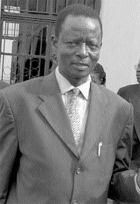 JOHN KEN LUKYAMUZI
JOHN KEN LUKYAMUZIPeter Mulira is the person I least expected to be uncertain about the system of government he cherishes. In his June 27 column, Mulira wrote, “Only the sharing of tax revenue recommended is not covered in the regional tier proposals. Mengo should open up to alternative views before committing the kingdom to an unnecessary constitutional crisis from which Buganda may never recover this time round.” Mulira’s remarks saddened me. Buganda is not dying to become a federal entity if what is thrown to it is merely decorated as federo. We are patient, as has always been the case. Above all, the federalism we are craving is for all the people of Uganda.
Uganda, which became independent in 1962, is a country of many nations, with a rich mosaic of cultures and traditions. That is why Winston Churchill referred to it as the Pearl of Africa.
The quest for federalism is not new. We voluntarily came together in our respective diversities to form one nation on the basis of the principle of unity in diversity. We lived happily at one time as a quasi-federal entity between 1962 and 1966 and our economy even registered an extraordinary boom. Since the collapse of the federal union among the regions, Uganda has never recovered from the confusion and economic decay.
Over 35% of the population today lives below the poverty line. Why is there endless war in northern Uganda? Why is corruption endemic and why are people so poor? There is no reliable formula to direct the distribution of the national cake. One has to be powerful to influence wealth distribution.
The federal system can reduce these economic disparities. Federalism is a system of government where executive powers, including sovereignty and independence, are constitutionally shared between the centre and the regions. It symbolises the right to live and act freely.
The regional tier should be referred to as LC6 because it is an extension of what LC5 does. The federal arrangement need not cover all the regions at its inception; it can begin with a few states as others get ready. In 1989, the decentralisation exercise started with 13 districts but as I write all the districts of Uganda are part of the decentralisation order. Why doesn’t the Government want the regions to collect taxes as well as plan for their survival? I smell a rat.
In the regional tier arrangement, everything related to finance is the responsibility of the centre. Worse still, the districts run parallel economic activities with the regions. In a federal order, the district will be under the region and the two power centres have a common goal and depend on each other in the collection and levy of taxes. It is meaningless to deprive the region of tax-collection while you let the district carry out the same activity.
A federal order would remove the need for a large Parliament and Executive. Service delivery is not dependent on the size of the Cabinet or Parliament in a federation. Tax collection and planning in a federation is a prerequisite for it enables the regions to build capacity as well as groom leaders, which would not happen in the regional tier. Why does Mulira want Mengo to accept any alternative if what Mengo is pursuing will equitably be shared by all the regions? Is Mulira looking for a ministerial job? Why should Buganda’s demand for federalism culminate in a constitutional crisis? That is defeatism. Buganda and other federo agitators should stick to what they want. They have nothing to lose but their chains.
The writer was the chairman of the federal studies caucus in the 7th Parliament
Published on: Saturday, 8th July, 2006


No comments:
Post a Comment